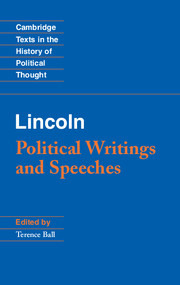Book contents
- Frontmatter
- Contents
- Preface
- Introduction
- Chronology
- Biographical synopses
- A note on sources and abbreviations
- Bibliographical note
- I Political Writings and Speeches
- 1 Autobiographical sketch
- 2 “The Perpetuation of Our Political Institutions”
- 3 Limits of Presidential Power
- 4 Speech on the Kansas–Nebraska Act
- 5 To Joshua F. Speed
- 6 Speech on the Dred Scott Decision
- 7 “A House Divided” Speech
- 8 Portion of a Speech at Edwardsville, Illinois
- 9 Seventh Lincoln–Douglas Debate
- 10 On Thomas Jefferson
- 11 Cooper Union Address
- 12 Speech at Indianapolis, Indiana
- 13 Speech at Independence Hall, Philadelphia, Pennsylvania
- 14 First Inaugural Address
- 15 Message to Congress in Special Session
- 16 Appeal to Border-State Representatives for Compensated Emancipation
- 17 Address on Colonization to a Committee of Colored Men
- 18 To Horace Greeley
- 19 Preliminary Emancipation Proclamation
- 20 Proclamation Suspending the Writ of Habeas Corpus
- 21 Second Annual Message to Congress
- 22 Final Emancipation Proclamation
- 23 To General John A. McClernand
- 24 To Erastus Corning and Others
- 25 To Matthew Birchard and Others
- 26 To James C. Conkling
- 27 The Gettysburg Address
- 28 Third Annual Message to Congress
- 29 Proclamation of Amnesty and Reconstruction
- 30 Reply to the New York Working-men’s Democratic Republican Association
- 31 To Albert G. Hodges
- 32 To Charles D. Robinson
- 33 Reply to a Southern Woman
- 34 “With Malice toward None”
- 35 Speech on Reconstruction
- II Notes and Fragments
- Index
20 - Proclamation Suspending the Writ of Habeas Corpus
Published online by Cambridge University Press: 05 April 2013
- Frontmatter
- Contents
- Preface
- Introduction
- Chronology
- Biographical synopses
- A note on sources and abbreviations
- Bibliographical note
- I Political Writings and Speeches
- 1 Autobiographical sketch
- 2 “The Perpetuation of Our Political Institutions”
- 3 Limits of Presidential Power
- 4 Speech on the Kansas–Nebraska Act
- 5 To Joshua F. Speed
- 6 Speech on the Dred Scott Decision
- 7 “A House Divided” Speech
- 8 Portion of a Speech at Edwardsville, Illinois
- 9 Seventh Lincoln–Douglas Debate
- 10 On Thomas Jefferson
- 11 Cooper Union Address
- 12 Speech at Indianapolis, Indiana
- 13 Speech at Independence Hall, Philadelphia, Pennsylvania
- 14 First Inaugural Address
- 15 Message to Congress in Special Session
- 16 Appeal to Border-State Representatives for Compensated Emancipation
- 17 Address on Colonization to a Committee of Colored Men
- 18 To Horace Greeley
- 19 Preliminary Emancipation Proclamation
- 20 Proclamation Suspending the Writ of Habeas Corpus
- 21 Second Annual Message to Congress
- 22 Final Emancipation Proclamation
- 23 To General John A. McClernand
- 24 To Erastus Corning and Others
- 25 To Matthew Birchard and Others
- 26 To James C. Conkling
- 27 The Gettysburg Address
- 28 Third Annual Message to Congress
- 29 Proclamation of Amnesty and Reconstruction
- 30 Reply to the New York Working-men’s Democratic Republican Association
- 31 To Albert G. Hodges
- 32 To Charles D. Robinson
- 33 Reply to a Southern Woman
- 34 “With Malice toward None”
- 35 Speech on Reconstruction
- II Notes and Fragments
- Index
Summary
One of Lincoln’s most controversial decisions during the Civil War was to suspend the writ of habeas corpus. This meant that suspects could be held without being charged with a specific crime, without trial before a jury of their peers, and without legal counsel. Far from acting extra-constitutionally, Lincoln claimed constitutional grounds: Article I, section 9 states that “The Privilege of the Writ of Habeas Corpus shall not be suspended, unless when in Cases of Rebellion or Invasion the public Safety shall require it.” The Confederate war against the United States, Lincoln reasoned, was a rebellion pure and simple and a threat to public safety. His critics were not mollified, however, and Lincoln had repeatedly to justify his decision to suspend habeas corpus (see selections 24 and 25).
By The Presidentof The United Statesof America
A Proclamataion
Whereas, it has become necessary to call into service not only volunteers but also portions of the militia of the States by draft in order to suppress the insurrection existing in the United States, and disloyal persons are not adequately restrained by the ordinary processes of law from hindering this measure and from giving aid and comfort in various ways to the insurrection;
Now, therefore, be it ordered, first, that during the existing insurrection and as a necessary measure for suppressing the same, all Rebels and Insurgents, their aiders and abettors within the United States, and all persons discouraging volunteer enlistments, resisting militia drafts, or guilty of any disloyal practice, affording aid and comfort to Rebels against the authority of the United States, shall be subject to martial law and liable to trial and punishment by Courts Martial or Military Commission.
Second. That the Writ of Habeas Corpus is suspended in respect to all persons arrested, or who are now, or hereafter during the rebellion shall be, imprisoned in any fort, camp, arsenal, military prison, or other place of confinement by any military authority or by the sentence of any Court Martial or Military Commission.
. . .
- Type
- Chapter
- Information
- LincolnPolitical Writings and Speeches, pp. 153 - 154Publisher: Cambridge University PressPrint publication year: 2012
- 1
- Cited by



